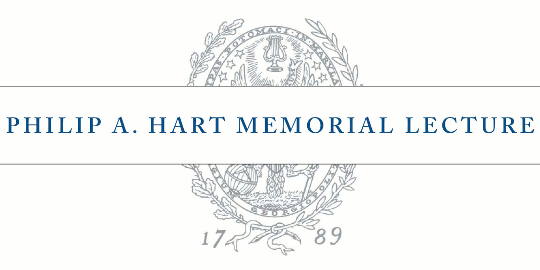Document Type
Lecture
Speaker
Hartog, Hendrik A.
Date
4-10-1991
Description
On April 10, 1991, Professor of Law, Hendrik A. Hartog of the University of Wisconsin Law School, delivered the Georgetown Law Center’s eleventh Annual Philip A. Hart Memorial Lecture: "Meanings of Marriage: The Structure of Marital Expectations in Nineteenth Century America."
Hendrik Hartog is the Class of 1921 Bicentennial Professor of the History of American Law and Liberty at Princeton University. He holds a PhD. in the History of American Civilization from Brandeis University (1982), a J.D. from the New York University School of Law (1973), and an A.B. from Carleton College (1970). Before coming to Princeton, he taught at the University of Wisconsin Law School (1982-92) and at the Indiana University (Bloomington) School of Law (1977-82). Hartog has spent his scholarly life working in the social history of American law, obsessed with the difficulties and opportunities that come with studying how broad political and cultural themes have been expressed in ordinary legal conflicts. He has worked in a variety of areas of American legal history: on the history of city life, on the history of constitutional rights claims, on the history of marriage, and on the historiography of legal change. He is the author of Public Property and Private Power: the Corporation of the City of New York in American Law, 1730-1870 (1983) and Man and Wife in America: a History (2000). He is the editor of Law in the American Revolution and the Revolution in the Law (1981) and the co-editor of Law in Culture and Culture in Law (2000) and American Public Life and the Historical Imagination (2003). Representative articles include “Pigs and Positivism” (Wisconsin Law Review, 1985); “The Constitution of Aspiration and ‘The Rights that Belong to us All’” (Journal of American History, 1987); “Mrs. Packard on Dependency” (Yale Journal of Law and the Humanities, 1988); “Abigail Bailey’s Coverture: Law in a Married Woman’s Consciousness” (in Law in Everyday Life, 1993); “Lawyering, Husbands’ Rights, and ‘The Unwritten Law,’ in Nineteenth-Century America” (Journal of American History, 1997); and “Llewellyn, Divorce, and Description” (in American Public Life and the Historical Imagination, 2003). He has been awarded a variety of national fellowships and lectureships, and for a decade he co-edited Studies in Legal History, the book series of the American Society for Legal History.
Rights Statement
Scholarly Commons Citation
80 Geo. L.J. 95-129 (1991)

